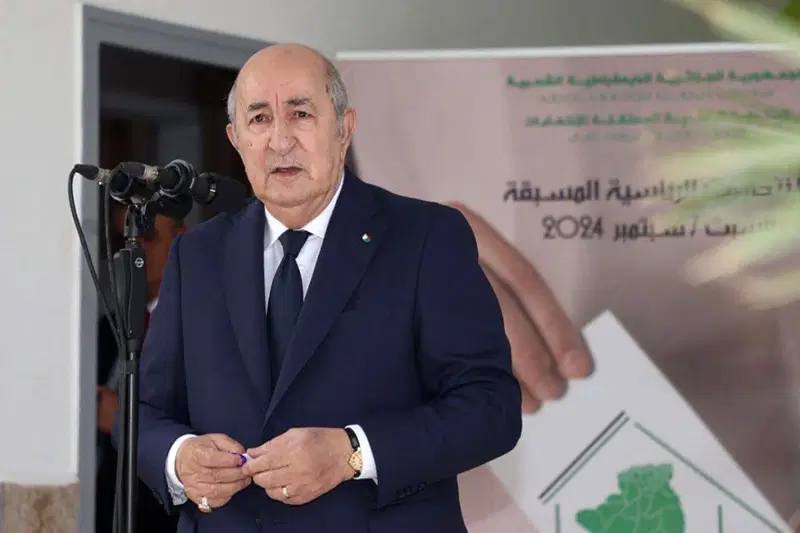World News
Tebboune re-elected as President of Algeria with 95% vote

Algeria’s incumbent President, Abdelmadjid Tebboune, has secured re-election with an overwhelming 94.65 percent of the vote, according to the country’s electoral authority, ANIE.
Over 5.3 million people voted for Tebboune, the 78-year-old president, as announced by ANIE head Mohamed Charfi on Sunday.
Tebboune faced two other contenders: moderate Islamist Abdelaali Hassani, who received 3.17 percent of the vote, and socialist candidate Youcef Aouchiche, who garnered 2.16 percent.
Despite the expected outcome, Tebboune’s priority was to increase voter turnout, especially after the 2019 election saw a record-low abstention rate of over 60 percent.
Tebboune first came to power in 2019 amid mass pro-democracy protests known as the Hirak movement, which eventually subsided under heavy policing during his presidency.
Earlier Sunday, Hassani’s campaign denounced attempts to “inflate the results”.
It said there had been a “failure to deliver vote-sorting records to the candidates’ representatives” and that it recorded “instances of proxy group voting”.
ANIE, which extended the vote by one hour on Saturday after reporting an “average” turnout, has yet to give the final rate of participation in the election.
– ‘Youth vote’ –
“The president has been keen to have a significant turnout,” Hasni Abidi, an Algeria analyst at the Geneva-based CERMAM Study Center, told AFP. “It’s his main issue.”
Tebboune’s win Sunday was still “a victory” although he failed to win the vote of young people, who represent half of Algeria’s 45-million-strong population, Abidi said.
As a result, Abidi said, the re-elected president has been “weakened”.
All three candidates have courted the vote of young people, with promises to improve living standards and reduce dependence on hydrocarbons.
After voting in Algiers Saturday morning, the Tebboune did not mention turnout, unlike Aouchiche who called for an end to the “boycott” and Hassani who said more voters would make the election “credible”.
– ‘Divorced politics’ –
Voters meanwhile expressed hopes that the election would transform things on the ground.
“We want this election to result in a real change… a change for the better,” said voter Hassane Boudaoud, 52.
Seghir Derouiche, 72, told AFP that not voting was “ignoring one’s right”.
Two women, Taous Zaiedi, 66, and Leila Belgaremi, 42, said they were voting to “improve the country”.
Ibrahim Sendjak Eddine, a day labourer, said Algerians “are looking for stability, job opportunities, work and housing”.
Yet Tebboune has touted economic successes during his first term, including more jobs and higher wages in Africa’s largest exporter of natural gas.
Although Algeria’s economy has grown at an annualised rate of about four percent over the past two years, it remains heavily dependent on oil and gas to fund its social assistance programmes.
He has pledged to create 450,000 jobs and increase social assistance programmes if re-elected.
Many “wondered what was the point of voting when all predictions were in favour of the president,” said Abidi.
“Not voting does not mean political opposition,” he added. “Rather, it means people did not see themselves as part of the electoral game.”
The analyst said Tebboune should now address the major deficit in political and media freedoms, with Algerians having “divorced current politics” after the Hirak protests ended.
Watchdog Amnesty International said earlier this week Algerian authorities were continuing to “stifle civic space by maintaining a severe repression of human rights”.
Five years after the Hirak protest movement, Algeria has seen “new arbitrary arrests” while authorities maintain “a zero tolerance approach to dissenting opinions”.
Dozens remain behind bars or are still being prosecuted due to their activism, according to prisoners’ rights group CNLD.





















